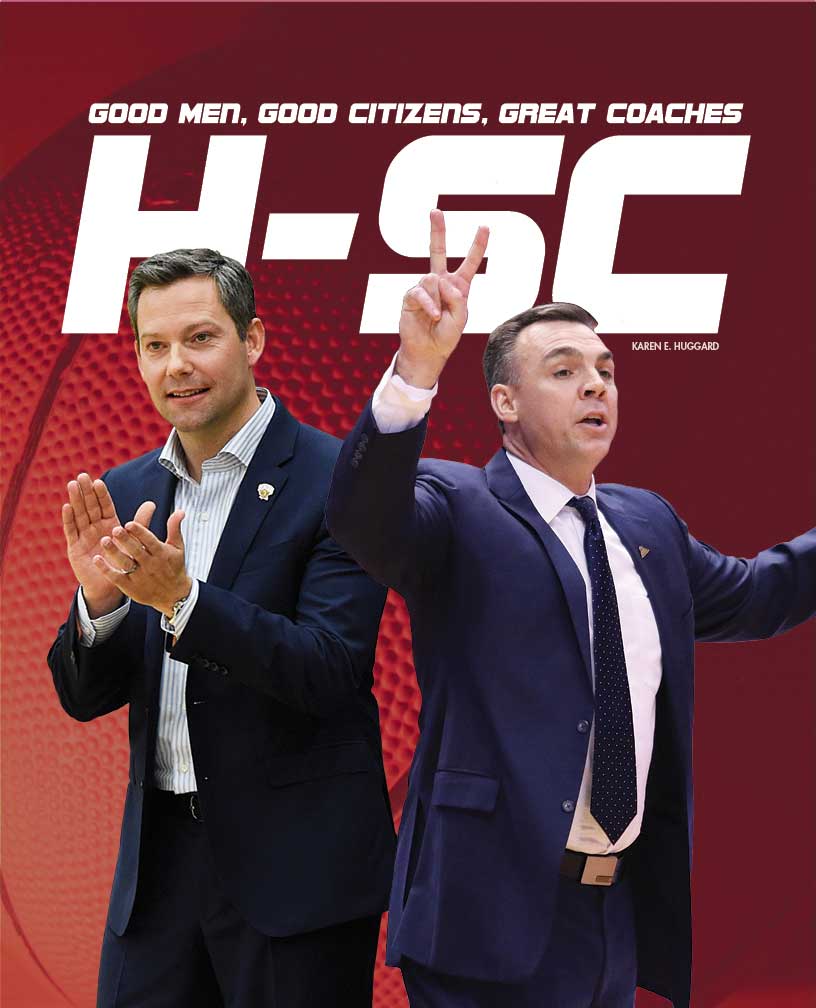 From The Record, Fall 2017
From The Record, Fall 2017
In the midst of growing scandals that would eventually rock the college basketball world and take down one of the NCAA's most powerful coaches, not one but two Hampden-Sydney men received national recognition for their character and leadership in collegiate basketball. Russell Turner '92 and Ryan Odom '96 were named finalists for the 2017 Skip Prosser Man of the Year Award, presented annually by CollegeInsider.com to a Division I head coach "who achieves success on the basketball court, while displaying great moral integrity off of the court, as well."
That two Hampden-Sydney hoops players from the same era would go on to successful careers in the high-stakes world of Division I athletics is, of course, impressive—there are only 347 head coaches in all of Division I men's basketball. But equally impressive is the manner in which these Hampden-Sydney men have carried the College's mission into that world, passing on the lessons they learned about honor and excellence as Hampden-Sydney Tigers some twenty years ago.
The Big Time
Both Turner and Odom pursued careers in coaching immediately upon graduation from H-SC, but each took a different path to a head coaching position. For Turner, currently in his eighth season as head coach at the University of California-Irvine (UCI), the journey included assistant coaching positions at almost every level of competitive basketball: high school, college, and the NBA. In six seasons at Wake Forest University and four seasons at Stanford University, he made a total of seven visits to the NCAA Tournament and two appearances in the Elite Eight; six seasons with the NBA's Golden State Warriors saw two rounds of postseason play. And as a head coach, Turner was named Big West Conference Coach of the Year in 2014 and led UCI to its first NCAA Tournament appearance in 2015.
Odom, on the other hand, has spent his entire career in collegiate basketball, almost exclusively at Division I universities. Seven years as an assistant coach at Virginia Tech and another five at UNC-Charlotte included two rounds in the NCAA Tournament; in his one year as head coach at Division II Lenoir-Rhyne University, he took the team to the Elite Eight. Now entering his second season at the University of Maryland-Baltimore County (UMBC), Odom was named the nation's top first-year Division I head coach in 2017 by CollegeInsider.com and led UMBC to its first three postseason wins in school history at the CIT Tournament.
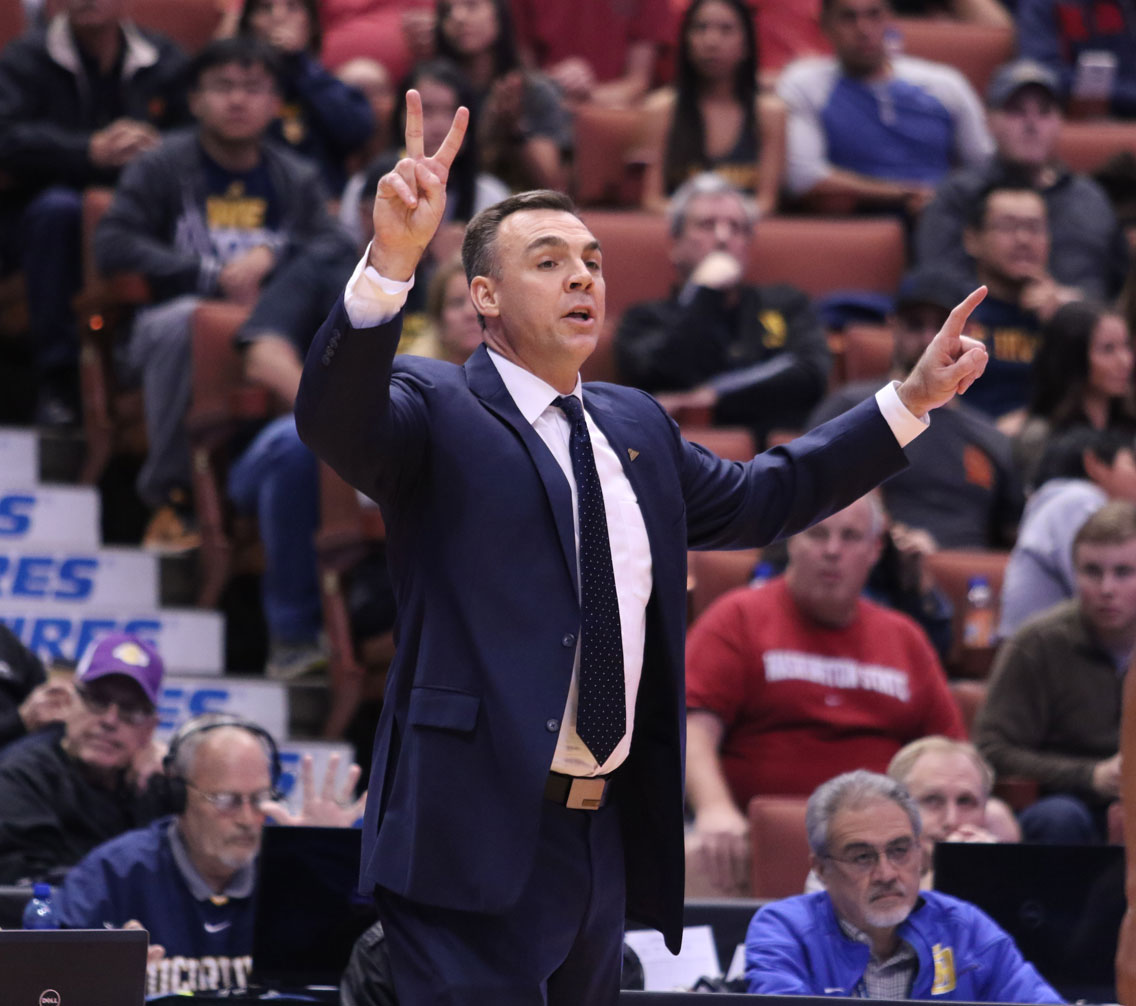
After a year assisting legendary coach Tony Shaver at Hampden-Sydney (where he coached a young Durant "Dee" Vick '94 and an even younger Ryan Odom, helping lead the Tigers to the Division III Sweet Sixteen), Turner spent six years at ACC powerhouse Wake Forest under Odom's father, three-time ACC Coach of the Year Dave Odom. With that experience came the opportunity to develop one of the most decorated players to emerge from Wake Forest: future NBA-great Tim Duncan. Turner's time with the Golden State Warriors brought a similar opportunity to coach NBA-superstar Stephen Curry. "Not too many people have been lucky enough to work with two guys who have been two-time NBA MVPs," notes Turner. "Tim and Steph are both grounded with values that I admire, and that contributed to them being great teammates and successful people. Both are men of incredible character who have great minds for the game, a passion for basketball, and a focus on improvement."
Turner calls his time in the NBA "the most exhilarating and exciting of my life." He continues, "Coaching at that level was an amazing learning experience. The players are the most driven and committed I've ever seen, and they're appreciative of coaching." He left the NBA to return to collegiate athletics, however, believing that was where he could make a difference. "People ask me, 'What's it like in the big time?' I truly believe the big time is where you are. For me, if it's important enough for young athletes to engage every day, to work to improve, to accomplish something as a team, to work for something bigger than the team—that's big time."
Character Counts
For Odom, the initial draw to a graduate assistant job with the University of South Florida's basketball team was a chance to remain connected to the game he loves. "I wasn't ready to give the game up when my time playing at Hampden-Sydney was done," he says. And as the son of a now-retired basketball coaching legend, he was familiar with the profession. What began as a way to extend his time on the court quickly morphed into a calling, though. Odom explains, "First I loved seeing the other side of the game, then I began to understand the impact coaches can have on these kids at a meaningful time in their lives. That's not something I take lightly, and that's why I'm still coaching today."
In fact, it was character development that drew Turner back to collegiate sports after his six-year foray into the NBA. He explains, "Mentorship is a huge part of why I do what I do—but the NBA is a business that's entirely about winning. College sports are different; we're coaching guys at the time when their character and leadership qualities are developing. It's fun to help build qualities that will lead to more success, but it's also rewarding to teach guys to be resilient when they face a lack of success. More than wins and losses, what matters to me as a coach is to see improvement in the people I'm working with."
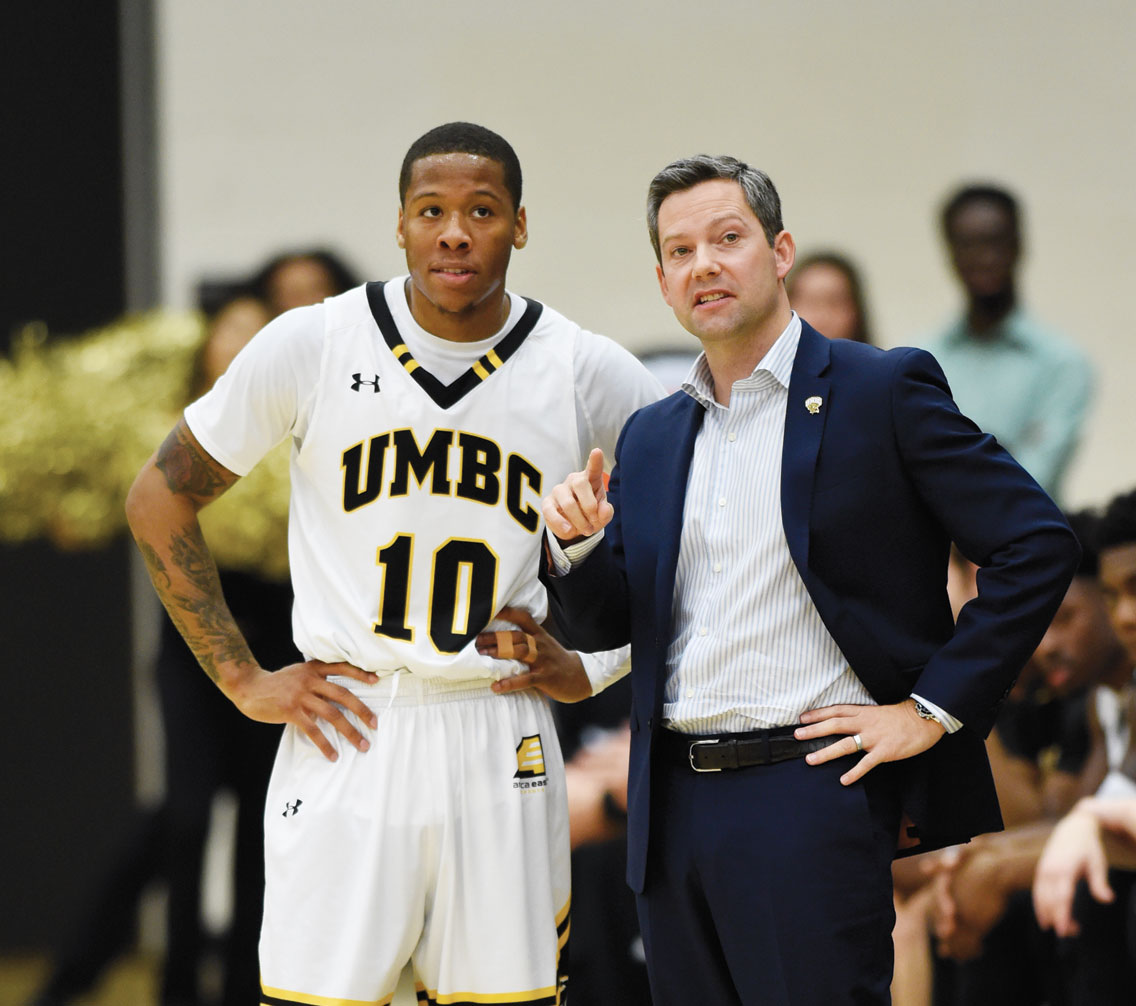 "Setting high expectations to be the best version of yourself you can be, upholding strong values—it's easy to argue that there's not enough of that in the world today," says Turner, who has incorporated aspects of the Hampden-Sydney tradition into his program, specifically the Honor Code. "It's a rather anachronistic idea in 2017, but I can't stress enough the importance of Hampden-Sydney's Honor Code, which I've carried over into my own program. Every week, my players have to sign an honor statement that directs them clearly toward our values. That practice comes directly from my experience at Hampden-Sydney."
"Setting high expectations to be the best version of yourself you can be, upholding strong values—it's easy to argue that there's not enough of that in the world today," says Turner, who has incorporated aspects of the Hampden-Sydney tradition into his program, specifically the Honor Code. "It's a rather anachronistic idea in 2017, but I can't stress enough the importance of Hampden-Sydney's Honor Code, which I've carried over into my own program. Every week, my players have to sign an honor statement that directs them clearly toward our values. That practice comes directly from my experience at Hampden-Sydney."
At UMBC, Odom is also building a values-based program. "Competitive sports are a great teacher: our players learn to work well with others, contribute to an overall team, practice humility, and deal with adversity," he says. "We attack one of our six core values each day, and we as coaches try to live them out in our daily lives. We try to model thankfulness, humility, servanthood, passion, accountability, and unity for our student-athletes." This approach has led to success on the court, with UMBC earning the second-most wins in school history during Odom's first season as head coach.
But a winning record only matters if it has been achieved the right way. "Your character defines who you are, and you can't be willing to sacrifice your integrity for short-term gains," Odom says. Talking about recent allegations of corruption and bribery in NCAA basketball, he notes, "I'm in this profession to mentor kids so they're ready for life after basketball, but unfortunately not everybody is. Like any profession, there are people of integrity who do things the right way, and there are others who don't." Odom continues, "We need to band together as a coaching profession to make sure we're all in it for the right reasons, because we're in charge of these kids at a time in their lives when we can really make a positive—or negative—impact."
A Basketball Brotherhood
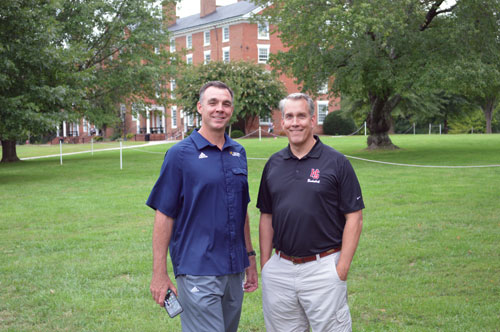 A conversation with either Odom or Turner about their own coaching philosophies will inevitably return to one name: Tony Shaver. According to Turner, Shaver "created an environment where everyone was challenged to grow," and that growth wasn't on the basketball court alone. "Coach Shaver had a tremendous influence on me as a man and a leader. Basketball is what initially drew us together, but even more so were the values he shared with us: integrity, excellence, and a commitment to family," says Turner.
A conversation with either Odom or Turner about their own coaching philosophies will inevitably return to one name: Tony Shaver. According to Turner, Shaver "created an environment where everyone was challenged to grow," and that growth wasn't on the basketball court alone. "Coach Shaver had a tremendous influence on me as a man and a leader. Basketball is what initially drew us together, but even more so were the values he shared with us: integrity, excellence, and a commitment to family," says Turner.
Former H-SC teammates Dee Vick and Scott "Griff" Aldrich '96 have also continued Shaver's legacy in the coaching profession: Vick, Shaver's assistant coach at William & Mary for five years, is now head coach at Hampden-Sydney, while Aldrich serves as Odom's head of basketball operations at UMBC. Turner calls Vick "a difference-making coach" and "an integral part of the fabric of Hampden-Sydney College"; Odom says Aldrich plays "a vital role in developing athletes on and off the court." He continues, "I want coaches on my staff who have integrity, who will mentor the guys, and whose values and character I respect—Griff is all of that."
Noting the number of Hampden-Sydney men from the Shaver era who are making an impact in the profession, Odom explains, "It all goes back to Coach Shaver. We love the game because of the experience we had playing for him at Hampden-Sydney and the values he instilled in us." Now, as peers in the coaching world, both Odom and Turner remain in close contact with Shaver. "There are certain people in your life that you rely on for counsel as a man and as a professional," says Turner. "Coach Tony Shaver is one of those people for me." Odom says he talks to Shaver about once a month, and enjoys seeing him on the road occasionally: "He and my father [Dave Odom] were my role models and really shaped the man I've become. I feel fortunate to have the opportunity to honor them now by how I coach." 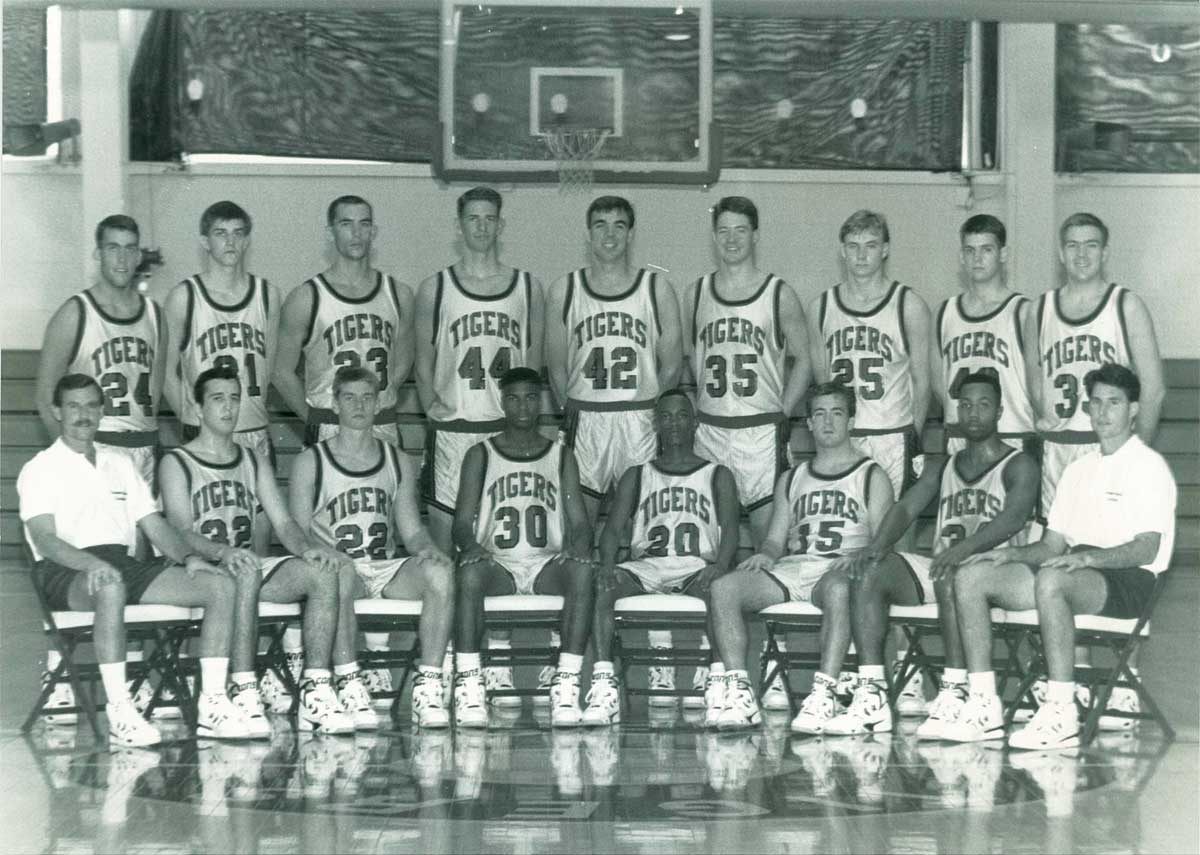
Brains and Brawn
Asked how relevant his Hampden-Sydney education is to his coaching career, Odom responds without hesitation: "Do I use it every day? Absolutely." He explains, "The discipline that it takes to earn a college degree—to be on top of things, to be organized, to do it every day—shapes who you become later on. At Hampden-Sydney, I was challenged off the court academically and on the court athletically, which gave me the discipline and focus that I needed to be successful." Odom applies that discipline and focus as he juggles the demands of a head coach: mentoring and developing players, managing a coaching staff, building a team culture—all while traveling near and far for competition and recruiting.
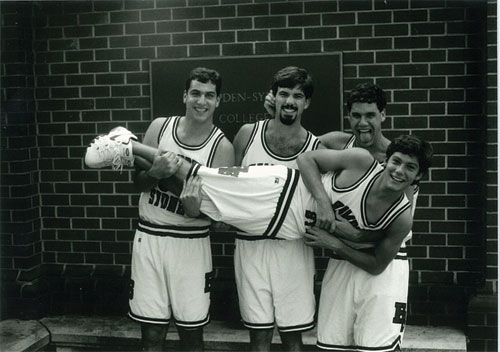 He also appreciates the College's rhetoric program, which he puts into daily use, as well. "Not a lot of colleges or universities have a program like Hampden-Sydney's to teach students how to write and speak well, yet those skills are so important in the professional world," Odom says. "As a coach, I communicate every day with players, boosters, university administration, and the press—and I can't risk being misunderstood or sending the wrong message. Hampden-Sydney students may not enjoy the rhetoric exam, but there's no doubt the program teaches them to communicate effectively and helps them after graduation."
He also appreciates the College's rhetoric program, which he puts into daily use, as well. "Not a lot of colleges or universities have a program like Hampden-Sydney's to teach students how to write and speak well, yet those skills are so important in the professional world," Odom says. "As a coach, I communicate every day with players, boosters, university administration, and the press—and I can't risk being misunderstood or sending the wrong message. Hampden-Sydney students may not enjoy the rhetoric exam, but there's no doubt the program teaches them to communicate effectively and helps them after graduation."
Turner agrees: "There's no disputing that a liberal arts education, with its focus on critical thinking, is valuable. But the way Hampden-Sydney presents that education is particularly valuable because of the focus on writing and communication. What I do absolutely requires critical thinking," he says, "but the most important skill in my profession is the ability to communicate effectively."
At Hampden-Sydney, Turner was a standout in the classroom as well as on the hardwood: with a double major in Economics and English, he graduated magna cum laude and was inducted into Phi Beta Kappa. "I was just a country kid from Roanoke, so Hampden-Sydney was a tremendous growth experience for me," says Turner. "I had never experienced teachers who could capture my interest enough to sustain high-level performance. The professors at Hampden-Sydney brought subjects to life and engaged my attention, though; that excited me and had an impact on my life." Turner's career has been spent at institutions with strong academic reputations—like Stanford and Wake Forest—which has only increased his appreciation for his own education. "I've often said I would stack my Hampden-Sydney education up against what's available at any school I've worked at, and I've been a part of some pretty good schools," he says with understatement.
Hampden-Sydney alumni often look back at their formative years on the Hill with nostalgia, and these coaches are no exception. "It's hard to express the amount of appreciation I feel," says Turner. "Hampden-Sydney has been a tremendous part of my journey." Odom echoes the sentiment. "I'm appreciative of the time and energy that the Hampden-Sydney community invested in me: the professors were caring, the coaches were influential, and the friendships are lifelong. I loved every second of my time at Hampden-Sydney."
Turner's and Odom's success in the coaching profession speaks to the power of a Hampden-Sydney education, and their recent nominations for Man of the Year are proof that the College's enduring mission to "form good men and good citizens" continues to spread far beyond our gates—even on the hardwood.
More News Stories
 From The Record, Fall 2017
From The Record, Fall 2017
 "Setting high expectations to be the best version of yourself you can be, upholding strong values—it's easy to argue that there's not enough of that in the world today," says Turner, who has incorporated aspects of the Hampden-Sydney tradition into his program, specifically the Honor Code. "It's a rather anachronistic idea in 2017, but I can't stress enough the importance of Hampden-Sydney's Honor Code, which I've carried over into my own program. Every week, my players have to sign an honor statement that directs them clearly toward our values. That practice comes directly from my experience at Hampden-Sydney."
"Setting high expectations to be the best version of yourself you can be, upholding strong values—it's easy to argue that there's not enough of that in the world today," says Turner, who has incorporated aspects of the Hampden-Sydney tradition into his program, specifically the Honor Code. "It's a rather anachronistic idea in 2017, but I can't stress enough the importance of Hampden-Sydney's Honor Code, which I've carried over into my own program. Every week, my players have to sign an honor statement that directs them clearly toward our values. That practice comes directly from my experience at Hampden-Sydney."  A conversation with either Odom or Turner about their own coaching philosophies will inevitably return to one name: Tony Shaver. According to Turner, Shaver "created an environment where everyone was challenged to grow," and that growth wasn't on the basketball court alone. "Coach Shaver had a tremendous influence on me as a man and a leader. Basketball is what initially drew us together, but even more so were the values he shared with us: integrity, excellence, and a commitment to family," says Turner.
A conversation with either Odom or Turner about their own coaching philosophies will inevitably return to one name: Tony Shaver. According to Turner, Shaver "created an environment where everyone was challenged to grow," and that growth wasn't on the basketball court alone. "Coach Shaver had a tremendous influence on me as a man and a leader. Basketball is what initially drew us together, but even more so were the values he shared with us: integrity, excellence, and a commitment to family," says Turner. 
 He also appreciates the College's rhetoric program, which he puts into daily use, as well. "Not a lot of colleges or universities have a program like Hampden-Sydney's to teach students how to write and speak well, yet those skills are so important in the professional world," Odom says. "As a coach, I communicate every day with players, boosters, university administration, and the press—and I can't risk being misunderstood or sending the wrong message. Hampden-Sydney students may not enjoy the rhetoric exam, but there's no doubt the program teaches them to communicate effectively and helps them after graduation."
He also appreciates the College's rhetoric program, which he puts into daily use, as well. "Not a lot of colleges or universities have a program like Hampden-Sydney's to teach students how to write and speak well, yet those skills are so important in the professional world," Odom says. "As a coach, I communicate every day with players, boosters, university administration, and the press—and I can't risk being misunderstood or sending the wrong message. Hampden-Sydney students may not enjoy the rhetoric exam, but there's no doubt the program teaches them to communicate effectively and helps them after graduation."